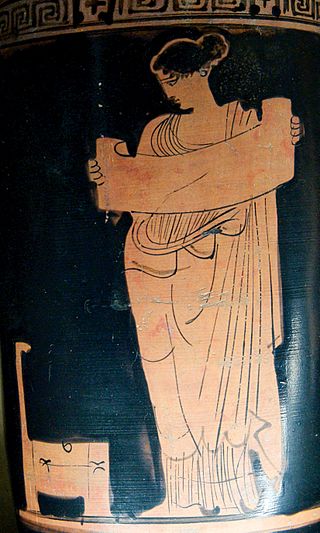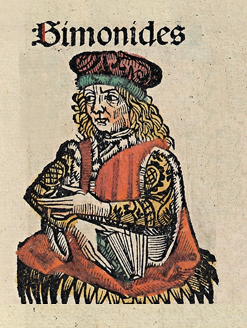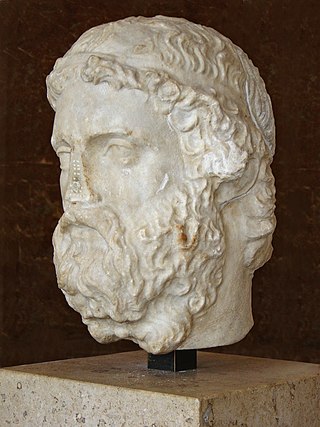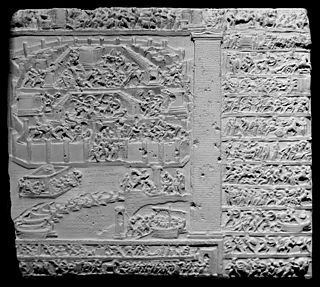
Alcaeus of Mytilene was a lyric poet from the Greek island of Lesbos who is credited with inventing the Alcaic stanza. He was included in the canonical list of nine lyric poets by the scholars of Hellenistic Alexandria. He was a contemporary of Sappho, with whom he may have exchanged poems. He was born into the aristocratic governing class of Mytilene, the main city of Lesbos, where he was involved in political disputes and feuds.

Sappho was an Archaic Greek poet from Eresos or Mytilene on the island of Lesbos. Sappho is known for her lyric poetry, written to be sung while accompanied by music. In ancient times, Sappho was widely regarded as one of the greatest lyric poets and was given names such as the "Tenth Muse" and "The Poetess". Most of Sappho's poetry is now lost, and what is extant has mostly survived in fragmentary form; only the Ode to Aphrodite is certainly complete. As well as lyric poetry, ancient commentators claimed that Sappho wrote elegiac and iambic poetry. Three epigrams formerly attributed to Sappho are extant, but these are actually Hellenistic imitations of Sappho's style.

In ancient Greek religion and mythology, the Muses are the inspirational goddesses of literature, science, and the arts. They were considered the source of the knowledge embodied in the poetry, lyric songs, and myths that were related orally for centuries in ancient Greek culture.

Simonides of Ceos was a Greek lyric poet, born in Ioulis on Ceos. The scholars of Hellenistic Alexandria included him in the canonical list of the nine lyric poets esteemed by them as worthy of critical study. Included on this list were Bacchylides, his nephew, and Pindar, reputedly a bitter rival, both of whom benefited from his innovative approach to lyric poetry. Simonides, however, was more involved than either in the major events and with the personalities of their times.
Ibycus was an Ancient Greek lyric poet, a citizen of Rhegium in Magna Graecia, probably active at Samos during the reign of the tyrant Polycrates and numbered by the scholars of Hellenistic Alexandria in the canonical list of nine lyric poets. He was mainly remembered in antiquity for pederastic verses, but he also composed lyrical narratives on mythological themes in the manner of Stesichorus. His work survives today only as quotations by ancient scholars or recorded on fragments of papyrus recovered from archaeological sites in Egypt, yet his extant verses include what are considered some of the finest examples of Greek poetry.

In Greek mythology, Erato is one of the Greek Muses, the inspirational goddesses of literature, science, and the arts. The name would mean "desired" or "lovely", if derived from the same root as Eros, as Apollonius of Rhodes playfully suggested in the invocation to Erato that begins Book III of his Argonautica.

In Greek mythology, the satyr Marsyas is a central figure in two stories involving music: in one, he picked up the double oboe (aulos) that had been abandoned by Athena and played it; in the other, he challenged Apollo to a contest of music and lost his hide and life. Literary sources from antiquity often emphasize the hubris of Marsyas and the justice of his punishment.

Modern lyric poetry is a formal type of poetry which expresses personal emotions or feelings, typically spoken in the first person. The term for both modern lyric poetry and modern song lyrics derives from a form of Ancient Greek literature, the Greek lyric, which was defined by its musical accompaniment, usually on a stringed instrument known as a kithara, a seven-stringed lyre . It is not equivalent to song lyrics, though song lyrics are often in the lyric mode, and it is also not equivalent to Ancient Greek lyric poetry, which was principally limited to song lyrics, or chanted verse.

Mimnermus was a Greek elegiac poet from either Colophon or Smyrna in Ionia, who flourished about 632–629 BC. He was strongly influenced by Homer, yet he wrote short poems suitable for performance at drinking parties and was remembered by ancient authorities chiefly as a love poet. Mimnermus in turn exerted a strong influence on Hellenistic poets such as Callimachus and thus also on Roman poets such as Propertius, who even preferred him to Homer for his eloquence on love themes.

Karl Otfried Müller was a German professor, scholar of classical Greek studies and philodorian.
Lesches is a semi-legendary early Greek poet and the reputed author of the Little Iliad. According to the usually accepted tradition, he was a native of Pyrrha in Lesbos, and flourished about 660 BC. Proclus refers to him as "Lesches of Mytilene". Mytilene and Lesbos are names of the same Greek island used interchangeably.

Ancient Greek literature is literature written in the Ancient Greek language from the earliest texts until the time of the Byzantine Empire. The earliest surviving works of ancient Greek literature, dating back to the early Archaic period, are the two epic poems the Iliad and the Odyssey, set in an idealized archaic past today identified as having some relation to the Mycenaean era. These two epics, along with the Homeric Hymns and the two poems of Hesiod, the Theogony and Works and Days, constituted the major foundations of the Greek literary tradition that would continue into the Classical, Hellenistic, and Roman periods.

Anacreon was a Greek lyric poet, notable for his drinking songs and erotic poems. Later Greeks included him in the canonical list of Nine Lyric Poets. Anacreon wrote all of his poetry in the ancient Ionic dialect. Like all early lyric poetry, it was composed to be sung or recited to the accompaniment of music, usually the lyre. Anacreon's poetry touched on universal themes of love, infatuation, disappointment, revelry, parties, festivals, and the observations of everyday people and life.

Stesichorus was a Greek lyric poet native of Metauros. He is best known for telling epic stories in lyric metres, and for some ancient traditions about his life, such as his opposition to the tyrant Phalaris, and the blindness he is said to have incurred and cured by composing verses first insulting and then flattering to Helen of Troy.
Olympus is the name of two ancient Greek musicians, one mythical who lived before the Trojan War and purportedly introduced instrumental music into Greece, and one apparently real, who lived in the 7th century BC. Both musicians were connected with the auletic music, which had its origin in Phrygia. It is possible that the elder and mythical Olympus was invented through some mistake respecting the younger and historical Olympus.

The epinikion or epinicion is a genre of occasional poetry also known in English as a victory ode. In ancient Greece, the epinikion most often took the form of a choral lyric, commissioned for and performed at the celebration of an athletic victory in the Panhellenic Games and sometimes in honor of a victory in war. Major poets in the genre are Simonides, Bacchylides, and Pindar.
Thaletas or Thales of Crete was an early Greek musician and lyric poet.

Greek lyric is the body of lyric poetry written in dialects of Ancient Greek. It is primarily associated with the early 7th to the early 5th centuries BC, sometimes called the "Lyric Age of Greece", but continued to be written into the Hellenistic and Imperial periods.
Phrynon of Athens was a general of ancient Athens, and a winner in ancient Olympic Games.














